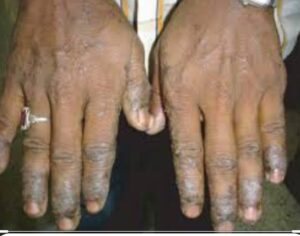
#dermatologyteaching
Let’s talk about hand dermatitis. I chose this topic because I know we’re all washing our hands frequently. Sooner or later, a lot of us will hand up with an irritant hand dermatitis if we don’t pay close attention to the hands.
‘Itis’ in medicine means inflammation. The components of inflammation include redness, swelling, pain and loss of function.
For the skin, it is a little different. The components of inflammation on the skin include redness, itching, oozing of fluid/vesicles and fissures on the skin. So dermatitis refers to inflammation of the skin. It can be acute which is made up of all the symptoms I listed as components of inflammation on the skin and the duration is short. It is referred to as chronic when the skin is thickened with exaggerated skin markings called lichenification with associated scaling.
Hand dermatitis refers to inflammation of the skin on the hands (either the front or back) which can be acute or chronic.
The causes are numerous but can be classified under irritant, allergic hand dermatitis and sometimes genetic. Occupation related hand dermatitis can fall under irritant or allergic hand dermatitis depending on what is causing it.
Hand dermatitis is quite common especially in females (more female do chores involving water than men). It is also more common in people that have background sensitive skin called atopic dermatitis.

Allergic hand dermatitis is immunologically mediated in susceptible people. For the doctors here, think of it like a rhesus incompatibility. The first child escapes any issues. So in allergic hand dermatitis, the first time a susceptible person is exposed to the allergen, he doesn’t react. The memory T cells store the allergen and there is a vigorous reaction next time the person is exposed to it even if it is in minute amounts. That’s why it may be hard to eliminate allergic contact dermatitis. An example is reaction to nickel or jewelry.
For irritant hand dermatitis, it is due to chemical / irritant damage to the skin and is not immunologically mediated. Everyone will react if exposed in sufficient amounts. E.g continuous exposure to water from washing hands can cause an irritant reaction for anyone, exposure to alkali in detergents or even acid.
Most people misdiagnose hand dermatitis as a fungal infection on the hands and place the patient on long term antifungal. There may be a superimposed fungal or bacterial infection especially because irritated skin is more susceptible because of the breaks in skin. But it is not always the case. Don’t put patients on antifungals for one year please. Always do a skin scraping for KOH microscopy and culture.
How do you differentiate between a hand dermatitis(HD) and fungal infection (FI) ?
The HD is usually symmetrical most times with the two hands affected in a similar pattern. For FI, even if the two hands are involved, it is unlikely to be strikingly similar. It would also likely have started from one hand.
The HD is usually itchy. FI may only be slightly itchy.
There may be a history of sensitive skin for HD. There may be a fungal infection elsewhere like the nails or feet in the case of FI.
How do you manage?
You will need to do a patch test to diagnose Allergic contact dermatitis (ACD). It is only for ACD and it has its advantages and shortcomings. Read more about it.

Have a habit of having a hand cream that you use up to 10 times a day. Especially after contact with water. It can never be too much. A hand cream containing 5 or 10% urea depending on the thickness of the hands especially if it has become chronic hand dermatitis.
Creams are better for acute hand dermatitis while ointments are preferable for chronic hand dermatitis (ointments have the consistency of vaseline blue seal).
Steroids will be needed in acute stage (but not on broken skin).
.
If it is occupation related, there may be a need to switch jobs. It can get that bad. Occupational related is usually suspected if it begins to gets worse each time the person is at work and there’s relief away from work.
Wear latex free gloves when you need to do wet work. Not for long as the heat in the gloves too can irritate after some time.
Stay away from any recognized exacerbating factor.
Treat superimposed fungal infection or bacterial infections when they occur. (See a doctor o).
You may not achieve 100% cure but quality of life will definitely improve.
We are washing our hands frequently. Let us pay attention to the care of the hands. COVID-19 will go by God’s grace. Don’t be left with irritant hand dermatitis from not paying attention to the care of the hands.
Any questions, comments or clarifications?


